After having selected nine players in the first rounds of the past three drafts, the Rockets aren’t eager to add another young prospect to their roster for the 2024/25 season, according to Jonathan Feigen of The Houston Chronicle (subscription required).
As Feigen explains, the Rockets are more interested in adding to their stockpile of future draft assets by trading their 2024 lottery pick to a team willing to give up picks in 2025 and beyond. A person with knowledge of the team’s thinking tells The Chronicle that those efforts have been “ongoing” for several months and are expected to continue leading up to draft day on June 26.
Barring an unexpected development in Sunday’s draft lottery, the Rockets’ project to have this year’s No. 9 overall pick, which initially belonged to Brooklyn. Houston’s own first-rounder, which projects to be No. 12, will be sent to Oklahoma City unless it moves into the top four. In that scenario, the Rockets would hang onto it and would hold two lottery picks, but the odds of that happening are just 7.1%.
Reports earlier this year indicated that the Rockets inquired about Nets forward Mikal Bridges prior to February’s trade deadline and were willing to give up a combination of Jalen Green and some of Brooklyn’s first-round picks that Houston controls. However, according to Feigen, the Rockets’ primary goal in those talks with the Nets was to push back their collection of draft picks.
Two sources familiar with the teams’ discussions tell Feigen that Houston general manager Rafael Stone sought the Suns’ draft assets controlled by Brooklyn in exchange for Nets assets held by the Rockets. It’s unclear based on Feigen’s wording whether Stone was willing to return control of all of Brooklyn’s picks in exchange for all of the Nets’ Phoenix assets or if just some picks on either side were involved in those talks.
Either way, Brooklyn “quickly dismissed” the idea, per The Chronicle, since the Nets wanted to focus on its efforts to be a playoff team rather than pivoting to a rebuild and bottoming out in order to fully take advantage of having their own draft picks back.
In addition to controlling the Nets’ lottery pick this year, the Rockets own Brooklyn’s unprotected 2026 first-rounder and have swap rights in 2025 and 2027. The Nets, in turn, hold the Suns’ first-rounders in 2025, 2027, and 2029 (all unprotected), with swap rights in 2028.
Assuming the Nets don’t want to revisit that concept, Feigen suggests Houston could reach out to another team that has accumulated several extra future first-round selections, such as Utah or Oklahoma City. However, the Jazz made three first-round picks last year and have two more first-rounders this year, including one that’s projected to be No. 8, ahead of Houston’s top pick.
The Thunder, meanwhile, may not be looking to add a rookie to a deep roster that appears increasingly close to title contention. However, it’s worth noting – especially if Oklahoma City ends up picking three spots behind Houston – that OKC has shown a willingness to trade up in the first round in recent years to ensure it lands its top targets. The Thunder moved up from No. 12 to No. 10 last year to nab Cason Wallace.
The Rockets’ efforts will be complicated by the fact that the top of the 2024 draft class is widely considered to be weaker than usual, so the No. 9 pick this year wouldn’t necessarily be equivalent in value to No. 9 in a typical draft. But for the sake of comparison, the last time a selection in that range was traded exclusively for future draft assets, the Knicks received three protected first-rounders from the Thunder in exchange for the No. 11 pick in 2022.
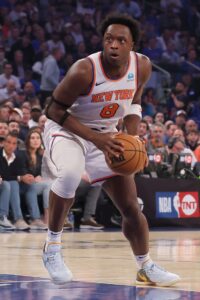 Anunoby is the latest addition to a growing list of injured Knicks frontcourt players. The team was already missing
Anunoby is the latest addition to a growing list of injured Knicks frontcourt players. The team was already missing 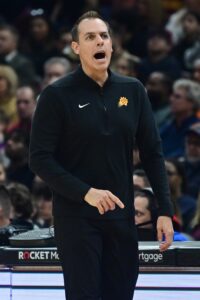 “After a thoughtful review of the season, we concluded that we needed a different head coach for our team,” said president of basketball operations and general manager James Jones. “We appreciate Frank’s hard work and commitment. We are here to win a championship and last season was way below our expectations.”
“After a thoughtful review of the season, we concluded that we needed a different head coach for our team,” said president of basketball operations and general manager James Jones. “We appreciate Frank’s hard work and commitment. We are here to win a championship and last season was way below our expectations.”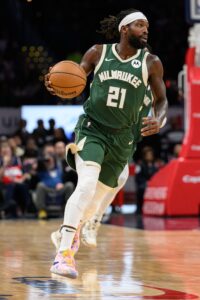 Since Beverley is an impending free agent, it isn’t yet known how much he will be fined, notes ESPN’s Bobby Marks (
Since Beverley is an impending free agent, it isn’t yet known how much he will be fined, notes ESPN’s Bobby Marks (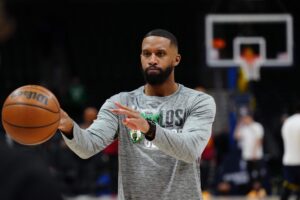 Lee will finish his playoff run in Boston before officially joining the Hornets, according to the announcement. Sources tell ESPN’s Adrian Wojnarowski (
Lee will finish his playoff run in Boston before officially joining the Hornets, according to the announcement. Sources tell ESPN’s Adrian Wojnarowski ( Jokic won the Michael Jordan Trophy by a wide margin, showing up on all 99 ballots and collecting 79 votes for first place, 18 for second place and two for third place, giving him a total of 926 points. Thunder guard
Jokic won the Michael Jordan Trophy by a wide margin, showing up on all 99 ballots and collecting 79 votes for first place, 18 for second place and two for third place, giving him a total of 926 points. Thunder guard 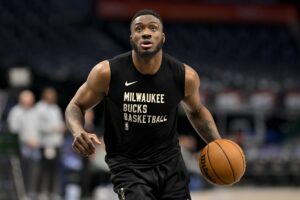 Charania doesn’t specify when the injury occurred or how long the recovery process is expected to take, but players who tear an Achilles often miss a full season.
Charania doesn’t specify when the injury occurred or how long the recovery process is expected to take, but players who tear an Achilles often miss a full season.